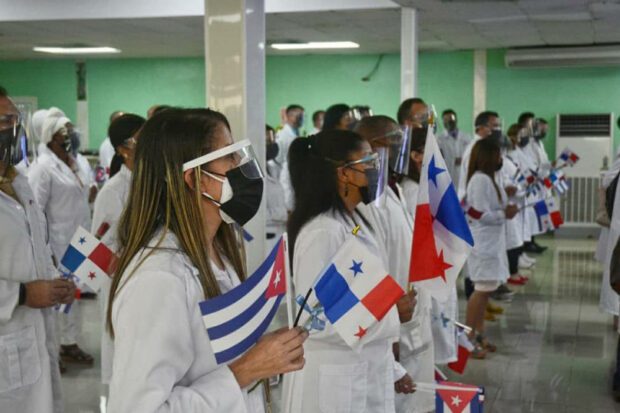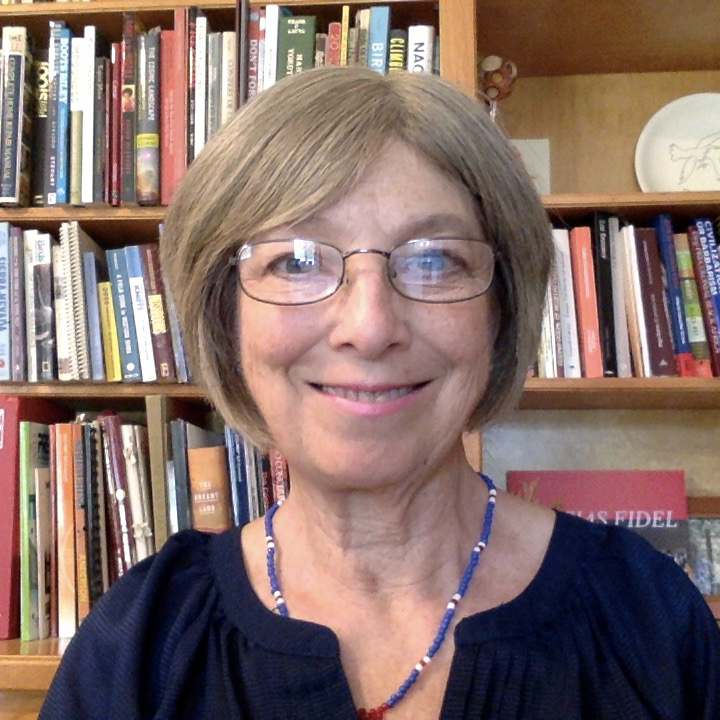
For many years, Cuba has been providing both disaster-related and not-quite-routine medical care to many countries in the world, almost all in the Global South. This is often focused on post-colonial countries that have an inadequate number of health workers, primarily doctors and nurses, and where those that do exist are not interested in working in remote areas or with poor patient populations.
More than 24,000 Cuban doctors currently serve in about 60 countries. Since 1960, some 600,000 Cuban health professionals have provided care in about 106 countries. This includes care provided free of charge to countries that need aid, and reciprocal agreements with countries that can afford to reimburse Cuba or share costs.
In addition to being a hugely effective source of aid to needy countries and international prestige for Cuba, this is now a main source of revenue for Cuba, where the normal economy is severely restricted by the U.S. blockade.
The United States has regularly denounced the Cuban health workers, who are generally popular in the countries they serve, and highly valued for fulfilling needs that would otherwise go unmet. They are esteemed in Cuba also, and being chosen for international medical missions is competitive, partly because Cuban education and social norms value and promote solidarity and altruism and partly because Cuban international health workers get paid more than they would get while working at home. Falsely, the U.S. government has claimed that these workers are exploited to the point at which this constitutes human trafficking.
On Feb. 25, the U.S. government made an attack on the Cuban international medical program by threatening those government officials in host countries. Marco Rubio, the Fanjul Sugar Empire pawn who is Trump’s secretary of state, announced that government leaders in countries with Cuban health workers could be banned from getting visas to travel to the United States.
In the Caribbean, many leaders responded with anger and concern.
Jamaica’s response has been mostly fearful: “Their presence here is of importance to our healthcare system,” Kamina Johnson Smith, Jamaica’s foreign minister, said at a press briefing last month, noting the island has more than 400 Cuban doctors, nurses, biomedical engineers and technicians. A loss of the Cuban health workers could mean a devastating loss of the care poor Jamaicans have come to depend on.
Granville Benjamin, a postal worker who has eye issues being treated by Cuban doctors, knows how vital the Cuban doctors are to Jamaica’s healthcare system.
“Jamaicans rely on the Cuban doctors because them do it for free, as well as the resources they bring here. And not only that, some of the medical students here go to Cuba to study. So it is really worrying,” he said.
In other Caribbean countries, leaders have been defiant:
“I will prefer to lose my U.S. visa than to have 60 poor and working people die,” declared St. Vincent and the Grenadines Prime Minister Ralph Gonsalves, referring to dialysis treatment provided by the Cuban doctors.
Trinidad and Tobago’s prime minister, Dr. Keith Rowley, said publicly, “I just came back from California, and if I never go back there again in my life, I will ensure that the sovereignty of Trinidad and Tobago is known to its people and respected by all.”
He also said, “Remember what happened during Covid when vaccines were required, and we couldn’t buy one even though we had the money? And even where we paid the money, those we paid put us at the back of the line?”
Grenada’s Prime Minister Dickon Mitchell stated, “We have a legitimate partnership with the government and people of Cuba who have over several decades provided support to the people of Grenada in the medical field. We will continue to support and defend the partnership.”
Gaston Browne, prime minister of Antigua and Barbuda, says the United States should treat the Caribbean with “some degree” of respect rather than threatening the region over the survival of its healthcare systems.
“We are not involved in any illegal activities, any human trafficking and we totally reject that notion that we are involved in any human trafficking,” and “if they were to take any punitive action against Caribbean countries because of the involvement of Cubans who are providing healthcare services, they will literally dismantle our healthcare services and put our people at risk.
“We are sovereign countries. Their enemies are not our enemies. We are friends of all, enemies of none.”
The prime minister of Barbados, Mia Mottley, declared, “Barbados does not currently have Cuban nurses or medical personnel, but I will be the first to state that we could not have overcome the Covid-19 pandemic without Cuban nurses and doctors. We pay them the same as we pay those from Barbados, and the idea, spread not only by this U.S. government but also by the previous one, that we are involved in human trafficking by collaborating with Cuban nurses has been totally repudiated and rejected by us.
“I am prepared, as are others in the region, that, if we cannot come to a sensible agreement about this affair and the price is that I lose my U.S. visa, so be it.”
David Comissiong, Barbado’s ambassador to CARICOM, said in a television broadcast that, 53 years ago, Caribbean prime ministers Errol Barrow, Michael Manley, Forbes Burnham and Dr. Eric Williams confronted similar pressures when the United States and the Organization of American States (OAS) demanded that the newly independent Caribbean nations refrain from recognizing Cuba.
At the time, they asserted their sovereignty, and he said they would continue to do so: “We are sovereign independent nations, and we will decide for ourselves what nations we will have relations with.”
He also emphasized that the United States has withdrawn all assistance from the Pan American Health Organization (PAHO), the regional branch of the World Health Organization (WHO), from which the United States has also withdrawn.
“The United States, having withdrawn itself from PAHO, will have a tremendous implication for all of us in the Caribbean, and you now turn around and say we must reject the much needed and critical health assistance being given to us by Cuba!”
He pointed out that the current U.S. policy is a continuation of the “U.S. vendetta against Cuba, aimed at ‘regime change,’” referring to the infamous 1960 U.S. State Department Mallory memo, which says that “the only foreseeable means of alienating internal support is through disenchantment and disaffection based on economic dissatisfaction and hardship…
“Every possible means should be undertaken promptly to weaken the economic life of Cuba…a line of action which makes the greatest inroads in denying money and supplies to Cuba, to decrease monetary and real wages, to bring about hunger, desperation, and overthrow of the government.”
The hope is that as the United States pressures become more severe, countries in the Caribbean will continue to maintain their sovereignty and resistance to U.S. pressure. The United States has more powerful threats to use, for as Jamaican singer and activist Jean Binta Breeze said in the song “Aid Travels with a Bomb”—“You think your country is oh so free, until you look at the economy…They come and rob you of your own, then send it back in a foreign loan. Interest is on its regulations too. They also decide your policy and you.”
Ambassador Comissiong, citing the Mallory memo, is right on target. The new U.S. threats and measures have nothing to do with health or human trafficking or compassion for people without healthcare, or truth, or anything other than damaging Cuba’s economy so that the United States does not have to face the power of a good example of social commitment to health and education provided at home and internationally by Cuba.
The U.S. policy is to regard healthcare as an expensive luxury, to be rationed by market mechanisms. In other words, as long as we are quoting songs, “The rich would live and the poor would die.” Doctors, even well-meaning ones, end up spending so much on their medical education that they cannot afford to be anything other than providers for the privileged few who can pay.
In Cuba, medical education, like all education, is free, and free healthcare is a universally accessible right for everyone.

